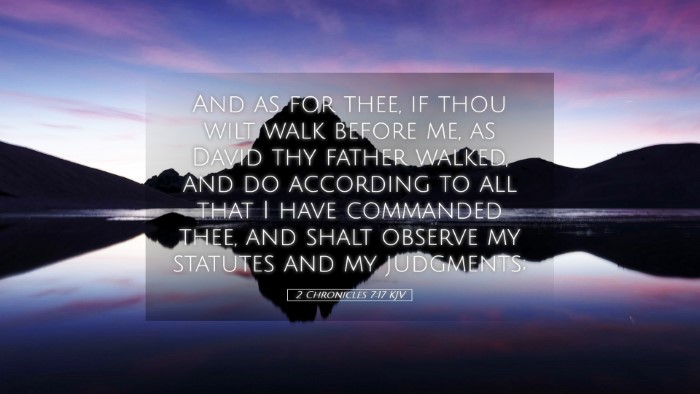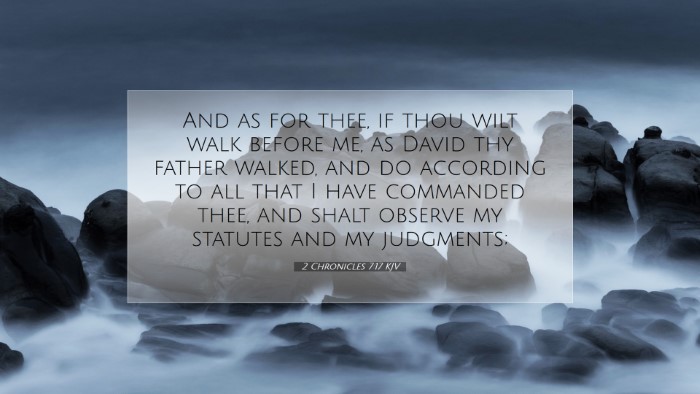Commentary on 2 Chronicles 7:17
Verse Context:
2 Chronicles 7:17 states: "As for you, if you walk before me as David your father walked, and do according to all that I have commanded you, and keep my statutes and my judgments."
Introductory Insights
Matthew Henry's Commentary:
Henry identifies this verse as a pivotal moment in the covenant relationship between God and His people, emphasizing the need for fidelity to God's commands as exemplified by David. He draws attention to how the fidelity of the ruler impacts the people, advocating that leadership must align with divine statutes.
Albert Barnes' Commentary:
Barnes iterates the significance of walking before God, which implies a constant, conscious commitment to God’s laws. He emphasizes a personal relationship that is both transformative and accountability-driven. Following David serves as a model for righteous living.
Adam Clarke's Commentary:
Clarke explains the historical context of this instruction, noting that David's life was characterized by deep devotion, sincere worship, and a seeking of God's will. For him, walking before God means to live in His presence, suggesting that divine favor is a product of faithfulness and obedience.
Theological Implications
This verse serves as a reminder of the covenantal expectations that God places upon leaders. The call to emulate David signifies a return to core biblical values that prioritize a heart aligned with divine principles.
1. Divine Expectations of Leaders
The leadership depicted in this verse underscores the principle of exemplary living. Leaders are not merely public figures; they are examples whose actions resonate throughout their communities. Both Henry and Barnes elaborate on the moral responsibility leaders have in reflecting God's character.
- Exemplary Conduct: The call to walk in the way of David is a directive for leaders to lead by example.
- Accountability: God holds leaders to a higher standard due to their influence over others.
2. The Nature of Walking Before God
The phrase “walk before me” implies an active, ongoing relationship with God. Clarke points out that this walking is indicative of a lifestyle, not simply a series of actions or a momentary commitment. It involves:
- Continual Alignment: Regularly aligning one’s life with God's will.
- Deepening Intimacy: Building a closer relationship with God through prayer and obedience.
- Steadfastness in Trials: Maintaining faithfulness even amidst challenges.
3. The Role of God’s Statutes and Judgments
This verse also highlights the importance of God’s commandments. Henry comments on the joy derived from following God’s laws, positing that they are not burdensome but pathways to life and prosperity. Barnes emphasizes that adherence to God's statutes leads to divine blessing.
Benefits of Obedience
Adhering to God's commands results in:
- Spiritual Growth: Obedience fosters a deeper understanding and relationship with God.
- Community Blessing: A community rooted in divine statutes experiences collective peace and prosperity.
- Divine Favor: God responds to faithfulness with favor, guidance, and blessings.
Practical Applications
The instruction to walk before God as David did serves as a powerful exhortation for contemporary believers, especially pastors and leaders.
1. Cultivate Personal Holiness
Pastors are called to cultivate a life of personal holiness, mirroring David's sincerity. This influences their ministries and congregations directly.
2. Strive for Integrity
Integrity in leadership and personal life is non-negotiable. Honoring God's commandments fosters trust and influences others positively towards the gospel.
3. Focus on Community Discipleship
Churches should prioritize teaching and embodying God's statutes, fostering a culture of discipleship that encourages every member to live out their faith genuinely.
Conclusion
The richness of 2 Chronicles 7:17 lies in its dual call to personal righteousness and community impact. As clergy and scholars reflect on this verse, they are beckoned to consider the weight of their walk with God and its reverberations throughout their circles of influence. Emulating David serves as an enduring challenge to live in faithful obedience, thereby inviting divine blessings that transcend individual experiences and resonate within the broader community.


